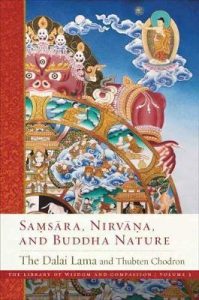Because ignorance and wisdom are diametrically opposed in the way they apprehend phenomena and because ignorance is an erroneous consciousness, wisdom can overcome ignorance. When ignorance is uprooted, all the afflictions that depend on it also cease.
Other counterforces do not have the ability to eliminate ignorance but are applied to individual afflictions. Since cultivating the wisdom realizing emptiness requires much time, we must learn and apply these more limited antidotes in the meantime to prevent our afflictions from getting out of hand.
Some antidotes to cultivate:
- To counteract attachment, craving, clinging, and greed, reflect on the impermanence of whatever person or object you are attached to. Contemplating the unattractive aspects of the person or object also works well.
- When you crave for existence in saṃsāra, contemplate the disadvantages of saṃsāra. This powerful antidote will redirect our aspiration to liberation.
- To pacify anger and vengeance, cultivate fortitude. To remedy hatred, hostility, resentment, and so forth, meditate on loving-kindness.
- To counteract conceit, contemplate the detailed divisions of phenomena, such as the eighteen elements, the twelve sources, and the twelve links of dependent origination. Seeing the enormity of what there is to understand, self-importance is deflated. In addition, by examining all the components of the self, attachment to a real self will diminish.
- To counteract arrogance, reflect on the kindness of others. Seeing that our abilities, talents, and knowledge are due to the kindness of others deflates puffed-up pride.
- To reverse jealousy, rejoice at others’ happiness, good qualities, good opportunities, and merit.
- To remedy anxiety and deluded doubt, observe the breath. Focus your attention on the gentle flow of your breath without allowing the mind to spin with fabricated, self-centered stories. When you are confused and cannot discern virtue from nonvirtue or what to practice from what to abandon on the path, study the sūtras and scriptures. They will provide excellent guidance.
- To lessen disturbing emotions in general, remember that they are not you; they are not who you are and are not embedded in the nature of your mind.
At the initial stages of practice, lessening our afflictions is difficult. They seem to arise out of nowhere because we are so habituated to them. Our counterforces are weak, and time and continuous effort are needed to strengthen the antidotes and to develop positive qualities. Being patient with ourselves and going ahead with a determined, optimistic attitude are important to train our minds in new mental habits.
The above counterforces are temporarily effective for the specific affliction they counteract. To gain proficiency in them we must practice them regularly, especially when we are not in the heat of an affliction. Having a regular daily meditation practice, where you can imagine applying these techniques to situations you may encounter or have already encountered, is very effective in this regard.
from: Samsara, Nirvana, and Buddha Nature (The Library of Wisdom and Compassion Book 3) by His Holiness the Dalai Lama and Thubten Chodron, pp. 140-141. https://wisdomexperience.org/product/samsara-nirvana-and-buddha-nature/

